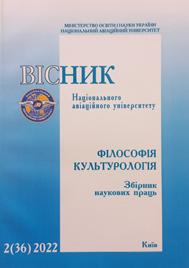SPECIFICITY OF SCIENCE IN THE CONTEXT OF ITS MORAL DIMENSION (CIVILIZATION ASPECT)
DOI:
https://doi.org/10.18372/2412-2157.36.16985Keywords:
science, morality, religion, scientific knowledge, scientism, anti-scientism, socio-cultural development, society, culture, manAbstract
Introduction. The relevance of the research is determined by the ambivalence of applying scientific knowledge, which can bring humanity
good and great harm. However, the issue is not science or scientific knowledge itself, but in whose hands it is, what social interests are
behind it, what social and state structures direct its development, and according to which values. That is, the answer to the questions of the
strategic development of science must certainly lie in its value, and moral dimension. The aim and tasks are a study of the specifics of
science in the context of its moral dimension in the conditions of modern civilizational progress of mankind. Research methods. The
methodological strategy of the research is based on socio-cultural, cultural-historical, systemic, and comparative methodological
approaches in their dialectical unity. Research results. It is important that science, as a part of the culture, is guided by socio-cultural
values in its development and does not lose touch with the real history of society. The problem of the relationship between science and
morality is correlated with the relationship between science and practical activity. This problem also actualizes the social responsibility
requirement of the scientific community not only for the direct result of the research but also for its practical use in various subsystems of
society and social life. Science needs social control to be oriented to the service of social progress because, beyond social and moral use,
scientific knowledge loses its cultural and humanistic dimension. Discussion. In the discussion, the author examines the issue of the
relationship between science and religion, which is an important component of the issue of the relationship between science and morality.
Conclusion. The main value criterion of modern scientific knowledge is the emphasis on the awareness of the socially significant limits of
theoretical research, supplementing it with cultural and ethical parameters and humanistic guidelines. The value imperative largely
determines the specifics of the professional ethics of the scientist himself, in particular, it presents a number of requirements for the ethics of
the process of scientific creativity and dictates some moral norms of the scientist's creative activity. It is worth remembering that science is
not an end in itself, it must serve man, his good.
References
Mах Planck. Religion und Naturwissenschaft. Vortrag gehalten im Baltikum (Mai 1937) von Dr. Max Planck. 2te unverand. Auflage. Joh. Ambrosius Barth Verl. Leipzig, 1938
Агацци Е. Моральное измерение науки и техники / пер. с англ. И. Борисовой. М.: Московский философский фонд, 1998. 344 с.
Величайшие ученые о науке, религии и Боге. 2018. О совместимости религии и науки https://iskander-bel.livejournal.com/
html
Гегель Г. Наука логики. Соч.: В 3-х т. Т. 2. М.: Мысль, 1971. 248 с.
Гейзенберг В. 1989. Физика и философия. Часть и целое / пер. с нем. М.: Наука. Гл. ред. физ.-мат. лит., 400 с.
Ломоносов М. В. Полн. собр. соч. М., 1961. С. 497.
Нобелевские Лауреаты и крупнейшие ученые о Творении и Создателе https://ecoteco.ru/id545/
Санкт-Петербургские ведомости 2001, 29 марта, С. 5
Степин В. С. Теоретическое знание. М.: Прогресс-Традиция, 2003. 744 с.
Таунс Ч. Журнал прикладной метафизики. М. №1. 2006. С. 31.
Толстой Л. Н. 1953.Полное собрание сочинений. Т. 6. М.: ГИХЛ.
Харпер П. Кто умножает знание – умножает зло. Диалоги: Полемические статьи о возможных последствиях развития
современной науки. М.: Политиздат, 1979. с.264.


